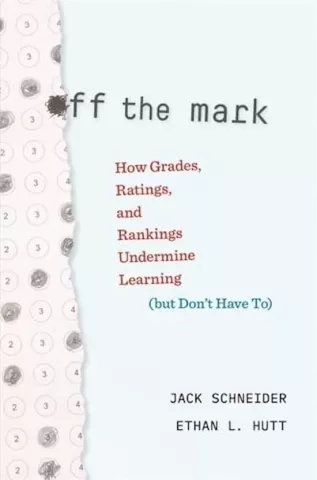
Key Takeaways
- Grading can be useful but it may be incentivizing the wrong things in the classroom.
- A new book argues that grading systems should be improved to more accurately assess what a student learns and can do.
Let’s talk about grading. (Yes, it’s OK to groan.) It’s a practice fraught with anxiety and frustration, but grading can be a useful tool for communicating with students and their families.
The problem is that grades have become less about communication these days. Instead, they are considered tokens to be exchanged for future success. Many students and parents agree that good grades lead to good transcripts, good colleges, a good job, and a good life.
In the book, Off the Mark: How Grades, Ratings, and Rankings Undermine Learning (but Don’t Have To), due out in August, authors Ethan Hutt and Jack Schneider write: “In the eyes of many students and parents, education has value because it can be traded for something else—social and economic advantage.”
Students’ decisions about how they approach schoolwork are strongly influenced by grading. The authors, both professors of education and policy, suggest that the current system incentivizes grades rather than a love of learning for discovery and personal growth.
Not so in kindergarten classrooms, which focus on inquiry, discovery, and joy. The students’ work, write the authors, is “guided by the inherent value of learning. The drive to understand, the thrill of knowing, and the delight of getting better at something that feels like it matters.”
Could it be that all we need to know about grading we learned in kindergarten? Well, it’s not that simple, but inspiring students to pursue learning rather than grades is the start. NEA Today spoke with Hutt about how our current system of grading can be improved to get at the heart of education—what a student learns and can do.
NEA Today: What lessons can we learn from kindergarten?
Ethan Hutt: In kindergarten classrooms, we teach kids to share and follow rules so everyone can thrive and learn. The idea to motivate kindergartners with assessment is preposterous, but it’s just as preposterous later. We can bring those ideas, those focuses on learning things because they are useful for their own sake, to other levels of school. Your book talks about “use-value” versus “exchange-value.”
Can you explain that idea?
EH: Focusing on the exchange-value of education, like good grades that can be used for advantage, undermines the use-value of education. We should place value on knowing things and being able to do things by emphasizing how schooling and education is an incredible gift in and of itself. Busywork that creates a product that is easy to grade is blurring the big picture of what is actually useful. Is the value of the assignment the grade? That’s exchange-value. Is the value of the assignment learning something new? That’s use-value.
How can teachers place more emphasis on use-value?

EH: By focusing assessment more on what we want students to know and the key skills we want them to be able to do. In math, that could mean students perform calculations but also provide an explanation for how they came up with the answer, and share that in writing or with the class. Rather than regurgitating facts on a science test, ask students to create a lab report or design experiments. Emphasize the performance of the task rather than on whether this one answer is correct. Educators can find a balance between some quick recall spot checks and creating space for students to perform a task while teachers provide feedback. Some tasks can have lower stakes with no grade assigned to it. Its value is in the performance of the task, not the assessment.
Another suggestion from the book is making grades “overwriteable.” How would that work?
EH: An example we use is riding a bike. Once you learn how, it no longer matters how many times you failed previously. In some cases, present performance can overwrite previous failures, rather than sitting unchangeable in a grade book. We should imagine an assessment system that reflects what students can do now.
It probably doesn’t make sense for every single grade to be overwritable, so teachers should pick and choose from their catalog of assignments.
The kind of scholarly essay research that I do, for example, gets feedback, and I make revisions before the final version gets out there. The premise is giving students an opportunity to improve and develop, which is more amenable to learning goals.
Clearly, we can’t give students the same exact test again and again. We should move away from more traditional assessments and toward those that get at the nuts and bolts of learning and show progress. An overwritable assignment will also need parameters, such as a set number of times you can redo the assignment within a certain time period. Not every assignment in the grading log could be overwritable, so we suggest honing in on a key area.
How does an overwritable assessment help address the challenge of “short-haul” and “long-haul” communication?

EH: The core challenge of grading is that it serves two functions. One is short-haul communication: simply telling a student how they are doing in class. Maybe you need to tell them this isn’t their best work and you know they can do better. Even though you are trying to send a signal that an assignment isn’t up to par, there is the idea that it follows the student on the dreaded “permanent record.” That’s when it becomes long-haul communication.
We suggest detaching those two things. When students are anxious about their grades, it’s hard to communicate with them as learners. Overwritable grades allow teachers to communicate in a safe space. There is more useful feedback.
What teachers can do is ask themselves, when I do my assessment, is this about communicating with students and parents, or filling my grade book?
Small reorientations among educators can make a real difference. It can inspire students to think, “What am I learning? What can I do? What am I proud of?” Students too often mistake their grade for learning and think the A, B, or C, is the only thing that matters. We encourage educators to pick a unit and make a change. Try it out, see how it goes, and share it with your colleagues.
What would it take to make competency-based measurements of learning the norm instead of grade-based progress reports?
EH: The default assumption for most teachers, schools, and districts is that everything is oriented around local, state, and federal assessments. All the rhythms of the year revolve around the testing calendar.
Everybody has their assessments, and they get layered on top of each other. The stakes are high, and the district wants to get ahead of the state assessments and do well, so they create assessments to gauge how students will perform.
First, districts and schools must figure out what is actually required. Especially after the pandemic, a lot of states have asked for leeway in how often assessments are given. We can all agree we don’t need more tests. Rather than relying solely on standardized tests, we need to work on assessments that include multiple measures, such as writing and critiquing poetry or doing open-ended research projects in history classes.
Moving toward this kind of system will take time, and nobody wants to be the first to deemphasize current assessments. If you don’t prepare for the standardized tests, your scores will look much worse than your colleagues’, and your school’s score will look worse than others in the district.
But with planning, communication, common metrics, and above all, buy-in, it’s doable. It can start with higher education. Colleges and universities are the big prize for parents.
If you tell parents you want to change the grading system to allow students to better show what they’ve learned, parents will worry that universities won’t accept the new measurements. But many higher education institutions no longer require ACT or SAT tests for admissions applications.
Universities are the gatekeepers. If they let K–12 educators be more innovative, that could move the needle in the right direction.
